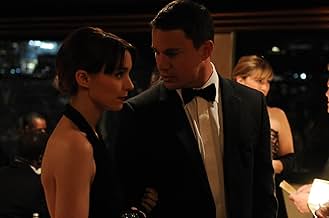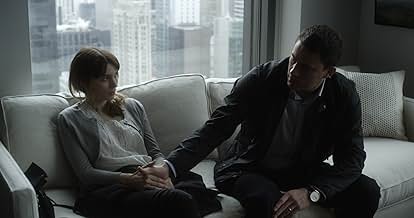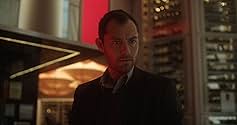Le monde d'une jeune femme s'effondre lorsqu'un médicament prescrit par son psychiatre a des effets secondaires inattendus.Le monde d'une jeune femme s'effondre lorsqu'un médicament prescrit par son psychiatre a des effets secondaires inattendus.Le monde d'une jeune femme s'effondre lorsqu'un médicament prescrit par son psychiatre a des effets secondaires inattendus.
- Réalisation
- Scénario
- Casting principal
- Récompenses
- 5 nominations au total
Avis à la une
This is one of those films that you believe you know what's coming, and then get pleasantly surprised that you were wrong. Really strong acting make this an enjoyable watch, and the direction from Mr. Soderburgh is near flawless. Film students and wannabe filmmakers should watch and take notes.
In our pharmaceutically inclined society, side effects are ever-present hazards of prescription drug usage. Whether they are minimized in print, or spoken in a hushed tone at the close of television commercials, side effects have become a shady companion of prescription drugs. Side Effects, Steven Soderbergh's alleged final film, focuses on the consequences visited upon a young couple after the side effects from the wife's medication cause her to commit an alarming act. As the chasm opens beneath this young woman, her psychiatrist struggles with his responsibility for her predicament, and confront his lingering suspicion about his patient's state of mind.
Ever the auteur, Soderbergh remains delightfully unpredictable with this latest feature. Side Effects initially presents itself as an indictment of the pharmaceutical industry, wearing its heavy-handed message on its sleeve, but promptly converts into a psychological suspense thriller. Soderbergh stares you directly in the eyes while he rips the rug from beneath your feet, sending you spiraling toward a conclusion that is equally unexpected and pleasing. Soderbergh and screenwriter Scott Z. Burns (Contagion, The Bourne Ultimatum) channel Hitchcock, creating an in-depth narrative that remains unpredictable until its final scene.
Soderbergh is known for generating a positive film environment for his cast, and maximizing the actors' potential in his films. Although the cast for Side Effects is comprised of actors who have previously provided impressive performances, each actor presents a character that rivals any prior roles. Rooney Mara plays the young woman at the epicenter of the conflict. Mara is extremely engrossing, creating an aura of discontent and depression within her situation. She acts as the film's catalyst, holding all the characters together while prompting them toward their conclusions. Attractive, graceful, and erratic, Mara is the wounded girl who isn't all that she seems.
While the film's driving force is Mara, Jude Law is its principle focus. As Mara's overwhelmed psychiatrist, Law provides his most empathetic role to date. Law establishes a flawed character who struggles with the consequences forced upon him, and transforms into a protagonist worthy of our admiration. Law and Mara provide such intriguing characterizations, Soderbergh seems to have difficulty deciding which to devote more time to. The scenes they share are the most arresting in this film.
There are few things more satisfying than a film which receives little attention, but creates an unexpectedly entertaining experience. Though Soderbergh has billed Side Effects as his swan song, he confirms that he is a cinematic mastermind in a film that would be an impressive conclusion to an eccentric career. Indulge in this unconventional thriller; you won't mind the side effects.
flickermotion.blogspot.com/
Ever the auteur, Soderbergh remains delightfully unpredictable with this latest feature. Side Effects initially presents itself as an indictment of the pharmaceutical industry, wearing its heavy-handed message on its sleeve, but promptly converts into a psychological suspense thriller. Soderbergh stares you directly in the eyes while he rips the rug from beneath your feet, sending you spiraling toward a conclusion that is equally unexpected and pleasing. Soderbergh and screenwriter Scott Z. Burns (Contagion, The Bourne Ultimatum) channel Hitchcock, creating an in-depth narrative that remains unpredictable until its final scene.
Soderbergh is known for generating a positive film environment for his cast, and maximizing the actors' potential in his films. Although the cast for Side Effects is comprised of actors who have previously provided impressive performances, each actor presents a character that rivals any prior roles. Rooney Mara plays the young woman at the epicenter of the conflict. Mara is extremely engrossing, creating an aura of discontent and depression within her situation. She acts as the film's catalyst, holding all the characters together while prompting them toward their conclusions. Attractive, graceful, and erratic, Mara is the wounded girl who isn't all that she seems.
While the film's driving force is Mara, Jude Law is its principle focus. As Mara's overwhelmed psychiatrist, Law provides his most empathetic role to date. Law establishes a flawed character who struggles with the consequences forced upon him, and transforms into a protagonist worthy of our admiration. Law and Mara provide such intriguing characterizations, Soderbergh seems to have difficulty deciding which to devote more time to. The scenes they share are the most arresting in this film.
There are few things more satisfying than a film which receives little attention, but creates an unexpectedly entertaining experience. Though Soderbergh has billed Side Effects as his swan song, he confirms that he is a cinematic mastermind in a film that would be an impressive conclusion to an eccentric career. Indulge in this unconventional thriller; you won't mind the side effects.
flickermotion.blogspot.com/
The poster of Side Effects features four famous faces on it: clockwise, you see Jude Law, Catherine Zeta-Jones, Rooney Mara, and Channing Tatum. There is a suggestion of a complex relationship between their characters - and of somewhat equal parts in the story. Both of those assumptions are proven false. Dr Jonathan Banks (played by Law) is gradually revealed as the protagonist of Side Effects, while his patient Emily Taylor (Mara) has a supporting, if most remarkable, role. Zeta-Jones plays the snake in the grass and spends most of the film out of sight, while Channing Tatum is briefly introduced as a handsome piece of furniture.
Side Effects has most in common with a Hitchcock thriller: Dr Banks faces a false accusation and must clear his name, with no support from his colleagues or from authorities. Characters are duplicitous and untrustworthy, and the question is not who is lying (everyone, everyone is lying), but how and why. Someone dies.
Rooney Mara delivers a great performance as a mentally unstable socialite - I whole-heartedly agree with Peter Bradshaw (The Guardian) praising her 'ability to be scared and scary at the same time'. As Mara's part is that of an unreliable narrator, it soon proves difficult to empathise with her character fully; instead, you spend a good while doubting her, yourself, and whether you are experiencing a déjà vu and whether you are experiencing a déjà vu.
There is no doubt that Side Effects is clever, yet, for me, the picture lacks in three important respects. The big questions about the use of mood-altering medication, experimental and otherwise, are raised, but then dropped as soon as the focus of the plot development shifts elsewhere. Two, the perilous and exciting romance - the supposed undercurrent of the narrative - feels shoehorned and staged. Finally, the ending brings us nearly full circle, and you are left wondering if the whole experience has had any effect on the protagonist.
Given that my original goal, when picking the film, was to see more praiseworthy acting by Zeta-Jones, I should find Side Effects satisfying. Unfortunately, as intelligent, ambitious, and well-acted as the film is, it lacks narrative cohesion and unity of tone, with the finale appearing as if a bow on a box.
Side Effects has most in common with a Hitchcock thriller: Dr Banks faces a false accusation and must clear his name, with no support from his colleagues or from authorities. Characters are duplicitous and untrustworthy, and the question is not who is lying (everyone, everyone is lying), but how and why. Someone dies.
Rooney Mara delivers a great performance as a mentally unstable socialite - I whole-heartedly agree with Peter Bradshaw (The Guardian) praising her 'ability to be scared and scary at the same time'. As Mara's part is that of an unreliable narrator, it soon proves difficult to empathise with her character fully; instead, you spend a good while doubting her, yourself, and whether you are experiencing a déjà vu and whether you are experiencing a déjà vu.
There is no doubt that Side Effects is clever, yet, for me, the picture lacks in three important respects. The big questions about the use of mood-altering medication, experimental and otherwise, are raised, but then dropped as soon as the focus of the plot development shifts elsewhere. Two, the perilous and exciting romance - the supposed undercurrent of the narrative - feels shoehorned and staged. Finally, the ending brings us nearly full circle, and you are left wondering if the whole experience has had any effect on the protagonist.
Given that my original goal, when picking the film, was to see more praiseworthy acting by Zeta-Jones, I should find Side Effects satisfying. Unfortunately, as intelligent, ambitious, and well-acted as the film is, it lacks narrative cohesion and unity of tone, with the finale appearing as if a bow on a box.
Good, but not great, crime-drama. Starts well: set up is good, character and plot development is interesting. Set up for an intriguing finish, especially as Jude Law's character is presented with a conundrum.
However, just when you're hooked, cracks start to develop in the plot. Not that the plot has holes, it just starts to get rather far-fetched. Too many twists, some just for twists' sake.
Ending feels contrived and a tad too neat.
However, still an interesting movie.
Good performance from Jude Law and Rooney Mara in the main roles. Catherine Zeta-Jones just doesn't feel right in her role, however. She's maybe too intense, or too one-dimensional.
Channing Tatum is okay in his role.
However, just when you're hooked, cracks start to develop in the plot. Not that the plot has holes, it just starts to get rather far-fetched. Too many twists, some just for twists' sake.
Ending feels contrived and a tad too neat.
However, still an interesting movie.
Good performance from Jude Law and Rooney Mara in the main roles. Catherine Zeta-Jones just doesn't feel right in her role, however. She's maybe too intense, or too one-dimensional.
Channing Tatum is okay in his role.
Steven Soderbergh has decided to end his career what can only be described as a pharmaceutical, psychosexual thriller that deals with several morally ambiguous characters all revolving around one horrible incident. Out of fear of giving away the intelligent, twist-filled plot written by Scot Z. Burns, that's really all I can say, although I can tell you that Soderbergh directs the film with extreme confidence, and it shows. He was able to convey a sort of quiet chaos with his frequent close-ups, and, by shifting in-and-out of focus throughout the screen, he was able to draw attention to the many small, yet important details.
The real strength of this film, though, is not necessarily the story itself, but how it is presented. To be honest, the story is almost too smart to the point of absurdity, but it never comes off as such. By releasing only one small piece of information at a time, we are kept waiting through interviews, court hearings, false trails, and many psychiatrist visits until, finally, everything comes together into one neat conclusion. The entire film is very subdued, but if you pay attention, you will be rewarded in the end.
Of course, the story would not have turned out so well without the multiple impressive performances that carry it all the way through. Rooney Mara is once again stunning as Emily Taylor, a woman who starts taking prescription antidepressants to cope with her husband's release from prison. Without giving much away, Emily is far more complex than she first appears, and Mara plays this perfectly by retaining a dark mysteriousness about her. She truly steals every scene she's in, and displays such a range of emotions that, at times, it's difficult to tell what her character is truly thinking. This is unfortunate for Channing Tatum, who does a fine job as her loving and sympathetic husband trying to make everything right after being released for insider trading, but who doesn't have close to enough material to compete with Mara.
Jude Law, on the other hand, is arguably the most central figure as Dr. Jonathan Banks, Emily's psychiatrist who is thrown into a scandal when his patient is involved in a tragic accident after taking an antidepressant he prescribed for her. He slowly mentally unravels as his decisions come back to haunt him, and eventually has to cross several moral boundaries in order to get his life back on track. Law shows this frustration with expert skill, and gives one of the best performances of his recent career. The same can be said for Catherine Zeta- Jones, who—as Emily's former psychiatrist Dr. Victoria Siebert—gives possibly the most complex performance, and does it brilliantly despite her lack of screen time.
To give away any more would be to say too much, as the film is so perfectly structured, it is difficult to discuss without giving away the whole thing. All I can add is, it is not so simple and straightforward as it may appear. It is a complex of characters, their motives, and the consequences of their actions, and, despite taking a while to get started, it is truly a spectacular, thrilling, and intricate journey that should not be missed.
The real strength of this film, though, is not necessarily the story itself, but how it is presented. To be honest, the story is almost too smart to the point of absurdity, but it never comes off as such. By releasing only one small piece of information at a time, we are kept waiting through interviews, court hearings, false trails, and many psychiatrist visits until, finally, everything comes together into one neat conclusion. The entire film is very subdued, but if you pay attention, you will be rewarded in the end.
Of course, the story would not have turned out so well without the multiple impressive performances that carry it all the way through. Rooney Mara is once again stunning as Emily Taylor, a woman who starts taking prescription antidepressants to cope with her husband's release from prison. Without giving much away, Emily is far more complex than she first appears, and Mara plays this perfectly by retaining a dark mysteriousness about her. She truly steals every scene she's in, and displays such a range of emotions that, at times, it's difficult to tell what her character is truly thinking. This is unfortunate for Channing Tatum, who does a fine job as her loving and sympathetic husband trying to make everything right after being released for insider trading, but who doesn't have close to enough material to compete with Mara.
Jude Law, on the other hand, is arguably the most central figure as Dr. Jonathan Banks, Emily's psychiatrist who is thrown into a scandal when his patient is involved in a tragic accident after taking an antidepressant he prescribed for her. He slowly mentally unravels as his decisions come back to haunt him, and eventually has to cross several moral boundaries in order to get his life back on track. Law shows this frustration with expert skill, and gives one of the best performances of his recent career. The same can be said for Catherine Zeta- Jones, who—as Emily's former psychiatrist Dr. Victoria Siebert—gives possibly the most complex performance, and does it brilliantly despite her lack of screen time.
To give away any more would be to say too much, as the film is so perfectly structured, it is difficult to discuss without giving away the whole thing. All I can add is, it is not so simple and straightforward as it may appear. It is a complex of characters, their motives, and the consequences of their actions, and, despite taking a while to get started, it is truly a spectacular, thrilling, and intricate journey that should not be missed.
Le saviez-vous
- GaffesDr. Banks would never have been allowed to be an expert witness in a case in which he was the defendant's psychiatrist. This would present a blatant conflict of interest. He could only be a fact witness.
- Citations
Dr. Jonathan Banks: Depression is an inability to construct a future.
- ConnexionsFeatured in The Tonight Show with Jay Leno: Épisode #21.81 (2013)
- Bandes originalesThe Forgotten People
Performed by Thievery Corporation
Written by Rob Garza (as Robert Garza) and Eric Hilton
Courtesy of ESL Music
Meilleurs choix
Connectez-vous pour évaluer et suivre la liste de favoris afin de recevoir des recommandations personnalisées
Détails
- Date de sortie
- Pays d’origine
- Sites officiels
- Langues
- Aussi connu sous le nom de
- Terapia de riesgo
- Lieux de tournage
- Sociétés de production
- Voir plus de crédits d'entreprise sur IMDbPro
Box-office
- Budget
- 30 000 000 $US (estimé)
- Montant brut aux États-Unis et au Canada
- 32 172 757 $US
- Week-end de sortie aux États-Unis et au Canada
- 9 303 145 $US
- 10 févr. 2013
- Montant brut mondial
- 63 414 135 $US
- Durée
- 1h 46min(106 min)
- Couleur
- Mixage
- Rapport de forme
- 1.85 : 1
Contribuer à cette page
Suggérer une modification ou ajouter du contenu manquant








































